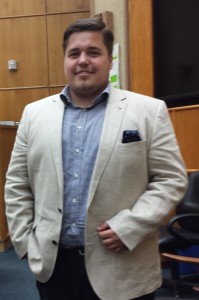 Bringing smart ideas and solutions to legal and social problems
Bringing smart ideas and solutions to legal and social problems
“In my region,” Tomislav Metelko says, “too much was put into the politics of reconciliation [creating] a mostly fake peace.” This comment may seem a bit shocking for a young man whose family feared bombing raids from the time Tomislav was a year old. He remembers the UN Peacekeepers finally leaving Croatia when he was twelve. 140,000 people had been killed following the breakup of Yugoslavia, and four million had become refugees. Twelve years later, conflict still affects Croatia “strongly, sadly, frighteningly, and constantly, especially with the economic crisis,” he says. He quotes Gordana Kuić, the Serbian author of The Smell of Rain in the Balkans, with “the best definition of war ever.” She says, “War is when everyone suffers.” So shouldn’t Tomislav be in favor of intensifying government efforts to reconcile belligerent factions?
When he was a junior at his university, he traveled to Serbia for the first time for a youth forum. This experience caused him to drastically rethink the options for citizens of South-East Europe. He feels it’s not productive to dwell on the ethnic cleansings, hate speech, nationalistic rhetoric, war crimes, and other horrors that keep the fires of animosity burning, but that leaders “should focus more on economy, how people live today, and how they’ll live tomorrow, in ten or twenty years, rather than on how they died twenty years ago.” He points out that “Politics always feeds on populism, and while politicians were talking about peace, entrepreneurs and business visionaries from different countries that were once [fighting each other] in a bloody war started working together to create progress.” Their primary goal wasn’t the promotion of peace and understanding, yet they made significantly more progress in that direction than those just talking about it.
Tomislav disputes the common belief that nationalism was the source of wars in his region. In the late 1980s, the national debt of the former Yugoslavia hit twenty billion dollars with a million people unemployed, an all-time high, fomenting an economic crisis. Tensions slowly rose between richer western states of Slovenia and Croatia, which called for greater autonomy, and the less developed east, led by Serbia, which clung to the traditional socialist centralism. The crisis served as a catalyst for Serbian nationalism which started in Kosovo, and quickly spread throughout the federation causing it to collapse in a series of bloody wars. In the present economy, thanks to the nationalist rhetoric of right-wing politicians, a resurgence of nationalism fires old resentments and sours relations between the neighboring countries. Tomislav stresses that enterprise, trade, and economic progress are the best way for people of differing nationalities, races, and religions to find similarities rather than differences and work toward common goals that will, in the end, result with more peace and understanding. “So fighting against nationalism is fighting for a prosperous society, economically speaking,” he says. And he’s earned the right to put these views forward.
From his early years at the Josip Juraj Strossmayer University of Osijek Faculty of Law, he also participated in many international events, training sessions, moot courts, simulated parliaments, interim sessions, competitions, and projects in Hungary, Ireland, Italy, and the Netherlands, in addition to South-East Europe. Tomislav’s team won two out of three awards at Moot Court Croatia (MCC), the Croatian national moot court competition, “which made us the most successful team in the 2015 edition and the most successful team ever from our University,” he says. He’s been an active member and vice president—in line to become president— in the Rotaract Club (affiliated internationally with Rotary). He’s a member of European Law Students Association (ELSA) and a past member of AIESEC, the largest student-led organization in the world. Also at his university, Tomislav has served as President of the Student Council of the Faculty of Law, elected to represent 3,000 students, resulting in three times more projects than under previous leaders. He is Executive Editor of LEGOS, one of two law students’ journals in Croatia. LEGOS publishes works by students on legal, political, and economical topics.
One contribution of which Tomislav is most proud is a project submitted to an Up2Youth competition held throughout Europe. His plan for connecting employers and universities was selected from among 40,000 entries to become part of the European Parliament’s political strategy for the 2014-2019 term. Its implementation could positively affect hundreds of millions of students.
Currently, he’s preparing to represent his university at Foreign Direct Investment International Arbitration Moot Court (FDI International Arbitration Moot) this November (2015) at King’s College in London, UK. Tomislav hopes to get an internship/traineeship in Croatia or abroad, ideally with a law firm, and finish his studies. “My passion is bringing smart ideas and solutions to legal problems,” he says, but his interests have expanded to include corporate, commercial, financial, and copyright/patent law, emphasizing international arbitration and mediation.
